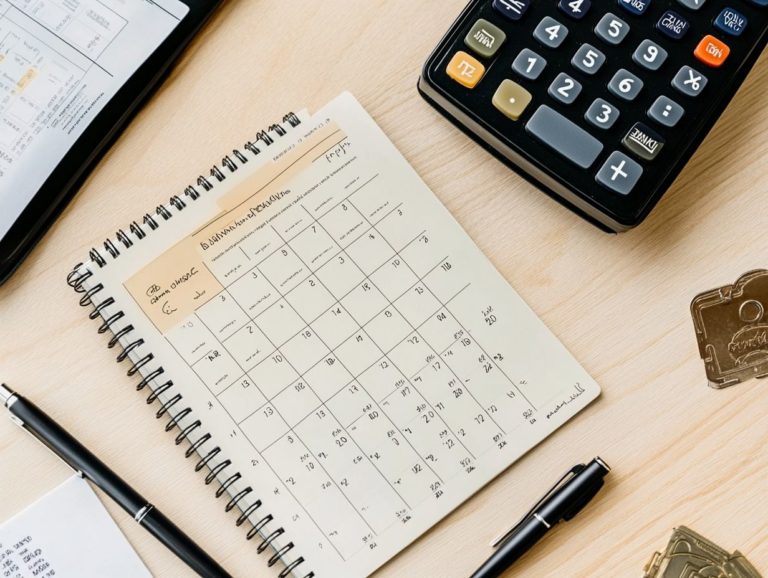How to Create a Personal Finance Plan?
Creating a personalized financial plan is essential for achieving financial stability and reaching your financial goals, whether they involve short-term dreams or long-term aspirations.
This guide will walk you through the process, beginning with a detailed review of your current financial situation and a thorough evaluation of your income and expenses. You ll discover how to set realistic financial goals, develop a sustainable budget, and effectively create a financial plan.
We will explore why monitoring and adjusting your strategy is important to ensure you stay on course. Get ready to take charge of your finances and navigate life’s biggest moments with confidence!
Contents
- Key Takeaways:
- The Importance of a Personal Finance Plan
- Assessing Your Current Financial Situation
- Setting Financial Goals
- Creating a Budget
- Implementing Your Personal Finance Plan
- Monitoring and Adjusting Your Plan
- Frequently Asked Questions
- Curious about what a personal finance plan is and why it matters? Let s dive in!
- What are the key components of a personal finance plan?
- How do I create a budget as part of my personal finance plan?
- What are some important tips to keep in mind when creating a personal finance plan?
- How can a personal finance plan help me achieve my financial goals?
- Is it ever too late to create a personal finance plan?
Key Takeaways:

- A personalized financial plan is vital for achieving financial stability.
- Assessing your current financial situation and setting realistic short-term, mid-term, and long-term goals are crucial steps in creating a successful finance plan.
- Regularly reviewing your income and expenses is crucial for maintaining financial health.
The Importance of a Personal Finance Plan
In today s fast-paced world, grasping the significance of a personal financial plan is crucial for securing your financial future and achieving peace of mind. A well-crafted financial plan gives you the power to navigate life’s biggest moments, whether it’s purchasing a home, starting a family, or preparing for retirement.
By establishing clear financial goals be they short-term goals, mid-term goals, or long-term goals you can create a tailored financial strategy that aligns with your ambitions.
This plan covers essential aspects like budgeting tools, managing debt, securing life insurance, and planning for taxes. It ensures that you are well-equipped for both the expected and the unexpected in life s journey.
Why You Need a Plan
A personal finance plan is essential; it serves as your roadmap for achieving financial goals and securing your future.
By outlining specific steps and strategies, it gives you the power to manage debt more effectively, equipping you to navigate challenges without falling into financial traps (unexpected expenses that can cause debt). This structured approach encourages you to prepare early for retirement, paving the way for better investments and savings habits that can profoundly enhance your quality of life in later years.
Creating an emergency fund becomes much simpler, as you can allocate a portion of your income toward this vital safety net, providing you with peace of mind and financial stability during unforeseen circumstances. Such a comprehensive plan fosters financial habits that yield enduring benefits.
Assessing Your Current Financial Situation
Before you embark on creating a personalized financial plan, it s essential to conduct a detailed review of your current financial situation. This involves a careful evaluation of your income, expenses, credit score, and credit history.
By understanding your financial landscape, you ll be able to pinpoint areas that need improvement and set realistic financial goals. This foundational assessment paves the way for knowledge-based decision making, whether it pertains to budgeting, managing debt, or retirement planning.
Delving into your financial habits can uncover valuable insights that will guide you in crafting a solid financial plan.
Evaluating Income and Expenses
Evaluating your income and expenses is an essential step in crafting a comprehensive financial plan. By carefully analyzing all your income sources from your salary to those side hustles you can gain a crystal-clear understanding of your financial standing and investment portfolio.
Simultaneously, taking a close look at your monthly expenses bills, groceries, and even discretionary spending offers invaluable insights into your spending habits. Utilizing budgeting tools, whether apps or spreadsheets, can significantly streamline this process, making it much easier for you to track and categorize your financial transactions.
This structured approach not only highlights areas where you can trim costs but also helps you set realistic financial goals. Ultimately, this fosters better spending behavior and paves the way for long-term financial stability, ensuring you can invest beyond your 401(k).
Setting Financial Goals

Setting financial goals is a crucial element of any robust financial plan, as it offers both direction and motivation on your financial journey. Whether you re aiming for short-term goals, mid-term goals, or long-term goals, having a well-defined set of objectives is essential for prioritizing your financial decisions.
Your short-term goals might encompass building an emergency fund or eliminating credit card debt, while your mid-term aspirations could involve saving for a new home or contributing to a child’s education. Long-term goals typically center around retirement planning and establishing an estate plan, ultimately ensuring your financial stability for the years to come, while also considering options like a 401(k) a retirement savings plan sponsored by an employer or a Roth IRA, which allows you to withdraw money tax-free in retirement.
Short-Term and Long-Term Goals
Understanding the distinction between short-term and long-term financial goals is crucial for effective financial planning.
Short-term goals typically encompass objectives you aim to achieve within a year or two, like saving for a vacation or paying off a credit card. In contrast, long-term goals often extend beyond five years, dealing with aspirations such as building a robust retirement fund or purchasing your dream home. By recognizing the significance of both types of goals, you can prioritize your financial strategies more effectively.
Implementing a clear structure for achieving these goals helps you develop good money habits, allowing you to confidently allocate your resources toward each target. For instance, setting aside a specific amount each month for a down payment not only promotes effective budgeting but also enhances your overall financial health and peace of mind, ensuring you are ready for retirement.
Creating a Budget
Creating a budget is an essential element of a successful financial plan, enabling you to track your income and expenses with precision. A well-thought-out budget not only aids in managing your daily finances but also plays a pivotal role in building an emergency fund and attaining your financial goals.
Using budgeting tools gives you valuable insights into your spending habits, empowering you to make informed decisions regarding saving and investing. This structured approach allows you to prioritize your expenses while ensuring you remain focused on your financial aspirations.
Steps to Building a Realistic Budget
Building a realistic budget involves several essential steps that empower you to manage your finances effectively.
To embark on this journey, begin by assessing your total income, which encompasses salaries, side hustles, and any additional earnings. Once you have a clear picture of your incoming funds, the next crucial step is to carefully keep track of your spending. Break them down into fixed costs, like rent and utilities, and variable costs, such as groceries and entertainment.
Utilizing budgeting tools whether apps or spreadsheets can significantly streamline this process, allowing you to visualize your financial landscape with ease. This structured approach not only promotes informed spending but also fosters the development of healthy financial habits over time.
Implementing Your Personal Finance Plan
Now, it’s time to bring your plan to life! Implementing your personal finance plan is the essential next step after you ve established your financial goals and crafted a budget. This phase is all about cultivating positive financial habits, managing any debts, and protecting with insurance.
It requires both discipline and commitment to stay true to your strategies, whether that means consistently saving for an emergency fund or making strides in your retirement planning. By regularly reviewing your progress, you can adjust your plan as necessary, ensuring that it remains in harmony with your financial objectives.
Making Changes and Sticking to the Plan

Making changes and adhering to your financial plan is vital for long-term success and reaching your financial goals.
To maintain this commitment, regularly review your financial situation. Adjust your strategies as your life circumstances evolve.
Establishing robust financial habits like budgeting monthly, tracking your expenses diligently, and setting achievable milestones can significantly enhance your discipline and motivation.
These practices boost your accountability and cultivate a proactive mindset, empowering you to tackle unexpected challenges with confidence.
Seeking guidance from a financial professional or leveraging personal finance tools can provide you with valuable insights, making it easier to stay on course and review your financial plan whenever necessary.
Monitoring and Adjusting Your Plan
Monitoring and adjusting your financial plan regularly is essential to staying on course toward achieving your financial goals. Life is ever-changing, and shifts in income, expenses, or personal circumstances can significantly affect your financial landscape.
By routinely reviewing your financial plan, you can pinpoint areas that need modification. This allows you to refine your strategies and cultivate sound financial habits.
This proactive approach ensures that your financial plan adapts to your evolving needs and equips you to handle life s most significant moments with confidence.
Regularly Reviewing and Updating Your Plan
Regularly reviewing and updating your financial plan is essential for your financial success! Aim to do this at least once a year, or even more often if significant life events arise, such as a job change, marriage, or the arrival of a new child.
These milestones often bring about shifts in your financial goals, whether that s saving for education or planning for retirement.
It s essential to evaluate how these changes influence various aspects of your plan, including budgeting, investment strategies, and how much risk you are comfortable with.
By keeping your plan in sync with your current circumstances, you ensure it remains a valuable tool, guiding you toward your financial aspirations while adapting to your evolving needs.
Frequently Asked Questions
Curious about what a personal finance plan is and why it matters? Let s dive in!
A personal finance plan is a detailed outline of your current financial situation, goals, and strategies for managing your money. It helps you create a roadmap for achieving your financial objectives and ensures that you are making informed decisions with your money.
What are the key components of a personal finance plan?

A personal finance plan typically includes an assessment of your current income, expenses, assets, and liabilities, along with your short and long-term financial goals, savings and investment strategies, and a budget.
How do I create a budget as part of my personal finance plan?
To create a budget, start by listing all your sources of income and then track your expenses for a month. This will help you identify areas where you can cut back and allocate more funds towards your savings and investment goals.
What are some important tips to keep in mind when creating a personal finance plan?
When creating a personal finance plan, it’s important to set realistic and achievable goals. Regularly review and update your plan, prioritize saving and investing, and seek professional advice if needed.
How can a personal finance plan help me achieve my financial goals?
A personal finance plan helps you stay organized and focused on your financial objectives. By setting specific and measurable goals and creating a plan to reach them, you are more likely to achieve financial success and build long-term wealth.
Is it ever too late to create a personal finance plan?
No, it’s never too late to create a personal finance plan. Whether you are just starting your career or are close to retirement, having a financial plan can help you make the most of your money and ensure a more secure financial future.






